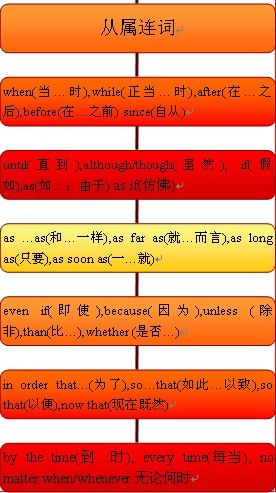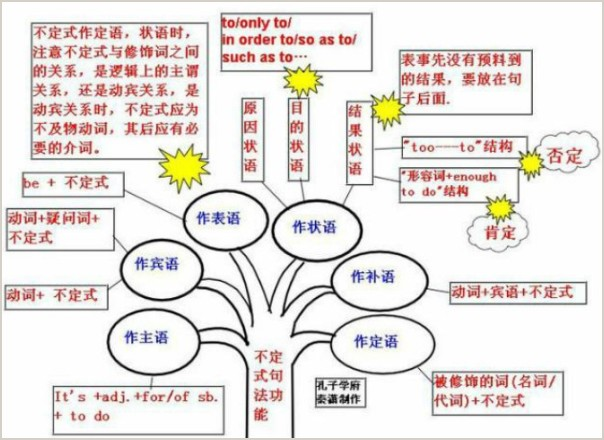本试题 “My English teacher's humor was ____ make ever student burst into laughter.[ ]A. so as toB. such as toC. such thatD. so that” 主要考查您对从属连词
不定式
等考点的理解。关于这些考点您可以点击下面的选项卡查看详细档案。
- 从属连词
- 不定式
从属连词的概念:
连词用于引导从句以形成句子的一部分或修饰句子的构成要素的叫作从属连词。
英语从属连词用法分类详解:
1、引导时间状语从句的从属连词:
(1)表示“当…时候”或“每当”的时间连词。主要的when, while, as, whenever:
如:He jumped up when the phone rang. 电话铃响时他吓了一跳。
We listened while the teacher read. 老师朗读时我们听着。
The phone rang just as I was leaving. 我正要离开,电话铃就响了起来。
(2)表示“在…之前(或之后)”的时间连词。主要的有before, after:
如:Turn the lights off before you leave. 离开前请关灯。
He started the job soon after he left the university. 他大学毕业后就开始做这份工作。
(3)表示“自从”或“直到”的时间连词。主要的有since, until, till:
如:He has lived here since he got married. 他结婚后就一直住在这儿。
Most men worked until[till] they're 65. 大多数男人工作到65岁。
(4)表示“一…就”的时间连词。主要的有as soon as, the moment, the minute, the second, the instant, immediately, directly, instantly, once, no sooner…than, hardly…when等:
如:Tell him the news as soon as you see him. 你一见到他就把这消息告诉他。
I recognized her the moment(that) I saw her. 我一看到她就认出她来了。
I want to see him the minute(that) he arrives. 他一到来我就要见他。
I went home directly I had finished work. 我一干完活就回家了。
Once he arrives, we can start. 他一来我们就可以开始。
(5)表示“上次”、“下次”、“每次”等的时间连词。主要的有every time(每次),each time(每次),(the) next time(下次),any time(随时),(the) last time(上次),the first time(第一次):
如:Last time I saw him, he looked ill. 上次我见到他的时候,他好像有病。
Next time you're in London come and visit us. 你下次来伦敦过来探望我们。
Do look me up next time you're in London. 你下次到伦敦来,一定来找我。
Every time I call on him, he is out. 我每次去访问他,他都不在。
You can call me any time you want to. 你随时都可以给我打电话。
【注】every time,each time,any time前不用冠词,(the)next time, (the)last time中的冠词可以省略,而the first time中的冠词通常不能省略。
2、引导条件状语从句的从属连词:
这类连词主要有if, unless, as[so] long as, incase等:
如:If anyone calls tell them I'm not at home. 要是有人打电话来,就说我不在家。
You will fail unless you work hard. 你若不努力就会失败。
As[So] long as you need me, I'll stay. 只要你需要我,我就留下。
In case I forget, please remind me about it. 万一我忘记,请提醒我一下。
【注】在条件状语从句中,通常要用一般现在时表示将来意义,而不能直接使用将来时态。不过,有时表示条件的if之后可能用will,但那不是将来时态,而是表示意愿或委婉的请求(will为情态动词):
如:If you will wait a moment, I'll fetch the money. 请等一下,我就去拿钱。
3、引导目的状语从句的从属连词:
主要有in order that, so that, in case, for fear等:
如:We used the computer in order that we might save time. 我们使用计算机是为了节约时间。
Speak clearly so that they may understand you. 说清楚,以便让他们能明白你的意思。
Be quiet in case you should wake the baby. 安静些,免得把婴儿吵醒。
He is working hard for fear he should fail. 他努力工作以免会失败。
4、引导结果状语从句的从属连词:
主要的有so that, so…that, such…that等:
如:We're all here now, so that the meeting can begin at last. 我们现在都到齐了,终于能开会了。
It's so difficult a question that none of us can answer it. 那是一个很难的问题,我们没有一个人能回答。
He shut the window with such force that the glass broke. 他关窗户用力很大,结果玻璃震破了。
【注】so that中的that在口语中通常可以省略。
5、引导原因状语从句的从属连词:
主要的有because, as, since, seeing(that), now(that), considering(that)等:
如:He couldn't got to school because he had a cold. 他因患感冒而未能去上学。
Since everybody is here, let's begin our discussion. 大家都到了,我们就开始吧。
Seeing that it is 8o'clock, we'll wait no longer. 由于时间已到8点,我们将不再等了。
Now that you are here, you'd better stay. 你既然来了,最好还是留下吧。
6、引导让步状语从句的从属连词:
主要有although, though, eventhough, even if, while, however, whatever, whoever, whenever, wherever等:
如:Although[Though] he is poor, he is well contented. 他虽穷却能知足常乐。
Though[Even though] it's hard work, I enjoy it. 尽管是苦活,但我乐意干。
Even if you don't like wine, try a glass of this. 即使你不喜欢喝酒,也尝尝这杯吧。
7、引导方式状语从句的从属连词:
主要有as, like, as if, as though, the way等:
如:Do it as[like] he does. 像他那样做。
He behaved as if nothing had happened. 他装作若无其事的样子。
They treat me as though I were a stranger. 他们待我如陌生人。
Nobody else loves you the way(=as) I do.没有人像我这样爱你。
8、引导地点状语从句的从属连词:
主要有where, wherever, everywhere等:
如:There were lots of parks where I lived. 我住的地方有许多公园。
Sit wherever you like. 你想坐在那儿就坐在那儿。
Everywhere they went, they were warmly welcomed. 他们每到一个地方都受到热烈欢迎。
9、引导比较状语从句的从属连词:
主要有than和as…as:
如:It's easier than I thought. 这比我想像的要容易。
They are as often wrong as they are right. 他们错对各半。
10、引导名词性从句的从属连词:
主要有that, if, whether:
如:It is clear enough what he meant. 他是什么意思很清楚。
Your greatest fault is that you are careless. 你最大的缺点是粗心大意。
Whether it will do us harm remains to be seen.是否对我们有害还要看一看。
She didn't say if he was still alive. 她没说他是否还活着。
从属连词知识体系:

用作从属连词的六类名词结构:
英语中有些名词结构可用作从属连词,用以引导状语从句,且主要是时间状语从句。这类结构归纳起来有以下六类:
一、the+瞬间名词:
其中的瞬间名词主要包括moment, minute, instant, second等,其意为“一……就……”,相当于as soon as。
如:The minute he saw her he fell in love. 他对她一见倾心。
Telephone me the moment(that) you get the results. 你一有结果,马上给我打电话。
I was so tired that I fell asleep the instant I closed my eyes. 我很累,一合上眼就睡着了。
Sheputdownthereceiverthesecondsherecognizedmyvoice.她一听出是我的声音,马上就放下电话听筒。
注:其中的瞬间名词后可接that,也可省略。另外,有的个别副词(如directly/immediately等)也可表示类似意思。
如: Immediately the meal was over,he switchedon the radio.饭一吃完他就把收音机打开。
二、the+季节名词:
其中的季节名词包括spring,summer,autumn,winter,其意为“在……的那年春天、夏天、秋天、冬天。
如:His wife left him thes pring he went abroad.在他出国的那年春天,他的妻子离开了他。
He sold his house and went to the souththe summer he lost hisjob.在他失业的那年夏天,他卖掉房子去了南方。
He was sentto prison the winter his third daughter was born.在他第三个女儿出生的那年冬天,他被关进了监狱。
She got married the autumn she graduated from college.她大学毕业的那年秋天就结婚了。
三、the+时间名词:
其中的时间名词主要包括hour,day,night,week,month,season,year等,其意为“在……的时候、那天、那个晚上、那周、那个月、那个季节、那年”。
如: The hour he wa sin her office,he felt very sad.当他在她办公室的时候,他感到很伤心。
The day here turned home,his father was already dead.他回家的那一天,他的父亲已经死了。
The night I wenttoseeher,shehadleftforBeijingtoattendanimportantmeeting.就我去看她的那个晚上,她到北京去开一个重要的会议了。
Mr Smith didn't go to work the week his wife was ill.史密斯先生在他妻子生病的那个星期没去上班。
They ear helivedinthecountry,he learned alot.他在乡下呆的那一年,他学到了不少东西。
四、the+序数词+time
其中的序数词包括first,second,third,fourth等,其意为“当第几次……的时候”。
如: My girlfriend beat me at pokert he first time weplayed.我头一次和女朋友打扑克,她就把我赢了。
These cond time I saw her,she looked like an old woman.我第二次见到她时,她看上去像一个老太婆。
The third time I went there,I found all of them had left and the offices were all empty.我第三次去那儿时,我发现他们都离开了,所有的办公室都是空的。
注:
1.next,last也具有类似序数词的性质,因此也具有以上用法。
如: Nexttimeyoucomein,pleaseclosethedoor.下次你进来,请关门。
Thelasttimewetalkedhesaidheneededanothertwodays.上次我们谈话时他说他还需要两天。
2.thefirsttime,thesecondtime,thethirdtime等用作连词引导时间状语从句时,其前通常要有定冠词,而(the)nexttime,(the)lasttime引导状语从句时,其中的冠词可以省略,如下面这道上海高考题,其答案是C,不是A:
I though ther nice and honest______Imether.
A.first time B.fo rthe first time C.the first timeD.by the first time
五、不定代词+time
其中的不定代词主要包括each,every,any等。
如:Every time I ringher,the phone is engaged.我每次给她打电话,电话都占线。
Every time I see him he either wants to tell me his trouble or borrow some money.每次我见到他,他不是向我诉苦,就是要向我借钱。
He felt nervous each times he spoke to him.每次她和他讲话,他都感到紧张。
AnytimeyoucometoLondondolookmeup.你无论什么时候到伦敦来,一定要来看我。
注意:everytime,eachtime,anytime用作连词引导状语从句时其前习惯上不用冠词,它与the first time,these cond time,the third time等引导时间状语从句时其前必须要用定冠词不同。
六、其他名词结构
以上归纳的名词结构均用于引导时间状语从句,有些其他结构还可引导其他性质的状语从句,如the way可用于引导方式状语从句,表示“像……一样”。如:
The didn’t do it the way we do now.那时他们不像我们现在这样行事。
Joyce looked at me the way alotof girls did.乔伊丝像许多姑娘那样瞧着我。
注:这样用的theway与as用法相似。
如:Hold itin both hands,the way(=as)Mummy does.用两只手捧住,像妈妈那样。
动词不定式的概念:
动词不定式指由to加上动词原形(而且只能是动词原形)所构成的一种非限定性动词,但在有些情况下to可以省略。动词不定式在语法功能上可作主语、宾语、宾语补足语、
表语、定语和状语。
不定式的特殊句型对比:
1、不定式的特殊句型too…to…:
1)too…to 太…以至于…。
例如:He is too excited to speak. 他太激动了,说不出话来。
—Can I help you? 需要我帮忙吗?
—Well, I'm afraid the box is too heavy for you to carryi t, but thank you all the same. 不用了。这箱子太重,恐怕你搬不动。谢谢。
2)如在too前有否定词,则整个句子用否定词表达肯定,too后那个词表达一种委婉含义,意为“不太”。
例如:It's never too late to mend. 改过不嫌晚。(谚语)
3)当too前面有only, all, but时,意思是:非常…等于very。
例如:I'm only too pleased to be able to help you. 能帮助你我非常高兴。
He was but too eager to get home. 他非常想回家。
2、不定式的特殊句型so as to:
1)表示目的:它的否定式是so as not to do。
例如:Tom kept quiet about the accident so as not to lose his job. 汤姆对事故保持沉默是为了不丢掉他的工作。
Go in quietly so as not to wake the baby. 轻点进去,别惊醒了婴儿。
2)表示结果:
例如:Would you be so kind as to tell me the time? 劳驾,现在几点了。
3、不定式的特殊句型:Why not:
“Whynot+动词原形”表达向某人提出建议,翻译为:为什么不……? 干吗不……?
例如:Why not take a holiday?
不定式的用法:
1、不定式作补语:
1)有些有动词+宾语+不定式的结构。
例如:advise allow cause challenge command compel drive驱使
enable encourage forbid force impel induce instruct invite like/love order permit make let have want get warn persuade request send tell train urge 等。
例如:Father will not allow us to play on the street. 父亲不让我们在街上玩耍。
The officer ordered his men to fire. 长官命令士兵开火。
注意:有些动词如make,have,get,want等可用不定式作做宾补,也可用分词作宾补。现在分词表达主动,也表达正在进行,过去分词表达被动。
2)有些有动词+宾语+不定式的结构,不定式的动词往往是be,不定式一般可以省去。
例如:consider find believe think declare(声称) appoint guess fancy(设想) guess judge imagine know 等。
例如:We believe him to be guilty. 我们相信他是有罪的。
We know him to be a fool. 我们知道他是个笨蛋。(tobe不能省去)
典型例题:Charles Babbage is generally considered___the first computer.
A. to invent
B. inventing
C. to have invented
D. having invented
答案:C. 一般没有consider+宾语+be以外不定式的结构,也没有consider+宾语+doing的结构,排除A、B、D。consider用动词be以外的不定式作宾补时,一般要求用不定式的完成式,故选C。 3)有些动词可以跟there+to be的结构。例如:believe expect intend like love mean prefer want wish understand 等。
例如:We didn't expect there to be so many people there. 我们没料到会有那么多人在那里。
You wouldn't want there to be another war. 你不至于想让另外一场战争发生吧。
2、不定式作主语:
不定式作主语,往往用it作形式主语,真正的主语不定式放至句子的后面。
例如:It's so nice to hear your voice. 听到你的声音真高兴。
It's necessary for you to lock the car when you do not use it. 不用车的时候,锁车是有必要的。
It's very kind of you to help us. 他帮助我们,他真好。
It seemed selfish of him not to give them anything. 他不给他们任何东西,这显得太自私了。
3、不定式作表语:
不定式可放在be动词后面,形成表语。
例如:My work is to clean the room every day. 我的工作是每天清扫房间。
His dream is to be a doctor. 他的梦想是成为一名医生。
4、不定式作定语:
不定式做定语通常要放在被修饰的词后,往往表示未发生的动作。
例如:I have a lot of work to do.我有许多事要做。
There was nothing to bring home that morning. 那天早上(他回家时)两手空空。
5、不定式作状语:
1)目的状语:常用结构为to do,only to do(仅仅为了), in order to do,so as to do,so(such)...asto…(如此…以便…)。
例如:He ran so fast as to catch the first bus. 他飞快地跑以便赶上第一班车。
I come here only to say good-bye to you. 我来仅仅是向你告别。
2)作结果状语,可以表示没有预料到的或事与愿违的结果,不定式要放在句子后面。
例如:I awoke to find my truck gone. 我醒来发现箱子不见了。
He searched the room only to find nothing. 他搜索了房间,没发现什么。
3)表原因:
例如:I'm glad to see you. 见到你很高兴。
She wept to see the sight. 她一看到这情形就哭了。
4)表示理由和条件:
例如:He must be a fool to say so.
You will do well to speak more carefully.
You will do well to speak more carefully.
不定式知识体系:

不定式用法拓展:
1、用作介词的to:
to可以用作介词,也可用作不定式的标示。下面的to都用作介词:admit to object to beaccus to med to beused to stick to turn to开始 look forward to be devoted to pay attention to contribute to apologize to devote oneself to
2、省去to的动词不定式:
1)情态动词(除ought外)后。
2)使役动词let,have,make后,感官动词see, watch, lookat, notice, observe, hear, listento, smell, feel, find等后。
注意:被动语态中不能省去to。
例如:I saw him dance. 我看见他跳舞。=He was seen to dance.
The boss made them work the whole night. 老板让他们整夜干活。 =They were made to work the whole night.
3)would rather,had better句型后:
4)Why…/why not…句型后:
5)help后可带to,也可不带to, help sb(to)do sth:
6)but和except后:
but前是实义动词do时,后面出现的不定式不带to。
比较:He wants to do nothing but go out. 他只想出去玩。
He wants to believe anything but to take the medicine. 除了吃这药,他什么都信。
7)由and, or和than连接的两个不定式,第二个to可以省去:
8)通常在discover, imagine, suppose, think等词后作宾补时,可以省去to be。
例如:He is supposed(to be)nice. 他应该是个好人。
3、动词不定式的否定式在不定式标志to前加上not。
例如:Tell him not to shut the window。让他别关窗。
She pretended not to see me when I passed by. 我走过的时候,她假装没看见。
4、It's for sb. 和It's of sb. 这样的句子中,由于表语形容词性质的不同,导致了不定式逻辑主语标志用for或of的区别。
1)for sb. 句型中的形容词一般为表示事物的特征特点,表示客观形式的形容词,如easy, hard, difficult, interesting, impossible等:
例如:It's very hard for him to study two languages. 对他来说学两门外语是很难的。
2)of sb句型中的形容词一般为表示性格,品德,心智能力,表示主观感情或态度的形容词,如good, kind, nice, clever, foolish, right。
例如:It's very nice of you to help me. 你来帮助我,你真是太好了。用for还是用of的另一种辨别方法:用介词for或of后面的逻辑主语作句子的主语,用介词前边的形容词作表语,造个句子。如果通顺用of,不通则用for。
例如:You are nice.(通顺,所以应用of)。
He is hard.(非所表达的意思,不通,因此用for。)
与“My English teacher's humor was ____ make ever student bur...”考查相似的试题有:
- Please make a list of ______ the celebration will need for the coming New Year and I’ll do the shopping.A.whatB.whi...
- Read the passage a second time, ___________ the meaning won’t become clearer to you.A.andB.soC.orD.but
- —Children must have access to good books.—I can't agree more. Reading is to the mind ________ food is to the body.A....
- We should spend the money ______ something _____ everyone.A.in; that benefitB.on; which benefitC.in; which benefit...
- Progress so far has been very good. ______, we are sure that the project will be completed on time.A.HoweverB.Other...
- 28. The firm invested approximately 60 million dollars in________it says is the world’s largest bottle-bottle recycli...
- One can fail at times, but _______ makes a difference is one’s attitude towards life.A.whatB.whichC.thatD.where
- Martin set out ______ his homework as soon as he went home.[ ]A. doingB. for doingC. to doD. to doing
- 改错。文中共有10处语言错误,要求你在错误的地方增加、删除或修改某个单词。增加:在缺词处加一个漏词符号(∧),并在其下面...
- Under the environment of fierce competition, the only way John could imagine ________ stresswas to get tougher by mak...